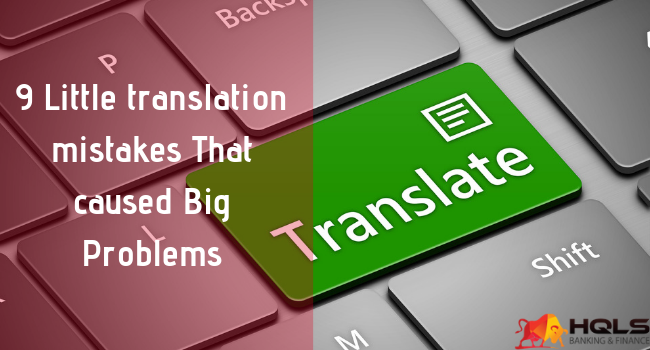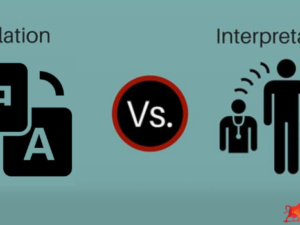
The translation is way more than changing information from the source language to the target language. Understanding the information and relating it to your listeners in their language is integral in translation. As such, all translators need to pay to understand a term before translating.
Any mistakes in translating information from one language to the other will breach communication. One party would leave with the wrong idea at best and at worst could have a fall out depending on how huge the impact of the mistake is.
Even the littlest translation mistakes can lead to big problems for all parties involved. In history, there have been several instances of translational mistakes. Let’s take a look with financial translation service team some that caused significant problems and talk about common translation mistakes or examples of bad translations.
#1. A 10 million dollar Translation Mistake
In 2009, one of the biggest banks in the world known for their slogan, “The World’s Private Bank” fell prey to the callbacks of a little translation mistake. HSBC launched a new campaign in 2009 with the tagline “Assume Nothing.”
However, problems came up when they started the tag line in other non-English speaking countries. Instead of translating to “Assume Nothing,” it was translated to “Do Nothing.”
This seemingly little translation mistake sparked up a big problem when people reacted negatively to the tagline. The Bank was forced to spend a lot of money purportedly 10 million dollars to reverse the fallout. One little translation mistake cost a big problem that needed 10 million dollars to solve.
#2. The Horned Moses
This example of how little mistakes in translation could lead to bigger problems is said to be the earliest case of its kind. So many years ago, St. Jerome dedicated a lot of time and effort to studying Hebrew so that he could translate the original Old Testament to Latin.
His goal was to translate the Old Testament straight from the original version which was written in Hebrew rather than from the translated Greek version.
He had noble intentions, but a little translating mistake stood out quite clearly on Moses’ head. In the passage where Moses comes down from Mount Sinai, his head was described as being radiant. In Hebrew, the word “Karan” means radiance with the similar word, “keren” translating to “horned.”
St. Jerome made a little translation mistake when he translated “keren” to horned rather than “karan,” which means radiance. The fault wasn’t entirely his as Hebrew is written without vowels. However, this little mistake led to years of Moses sculptures sporting a pair of horns.
#3. The 71 million Dollar Mistranslation
18-year-old Willie Ramirez’s case is an apt example of how a little translation could cause bigger problems. In 1980, young Willie was hospitalized in Florida while in a comatose state.
Willie’s family were the only people left who could give the doctors an idea of what could have led to Willie’s situation. The only problem was that Ramirez’s could only speak Spanish, and the doctors and paramedics could neither speak nor understand Spanish.
Bilingual staff at the hospital was brought in post-haste to understand what the Ramirez’s were trying to explain. A little translation mistake that translated “intoxicado” as “intoxicated” was all it took to leave Willie a quadriplegic and the recipient of 71 million dollars in malpractice settlement.
In truth, Willie suffered from an inter-cerebral illness and not the aftereffect of intoxication. The wrong treatment left him a quadriplegic.
#4. Lusting for the Future
In 1977, President Carter visited Poland, and the Polish government hired a Russian translator who could speak Polish to be the official translator.
While translating President Carter’s speech to Polish, little mistakes came up. The President ended up saying, “When I abandoned the United States” when he originally meant “when I left the US.” Another phrase was wrongly translated as “your desire for the future.” It was improperly translated as “your lust for the future.”
#5. The Mysterious Sheng Long
Avid gamers of the Japanese Street Fighter II spent a lot of time on a wild goose chase seeking the mysterious Sheng Long character. This character who was born from a mistaken translation was later made the object of a puzzle as an April Fools Day joke.
Sheng Long want a character in the video game but was born from a mistranslated phrase in the video game. A character in the video game says, “If you cannot overcome the Rising Dragon Punch, you cannot win.” When translated to the English Language, Rising Dragon is translated as Sheng Long.
#6. The Treaty of Waitangi
The Treaty of Waitangi was drawn up in 1840 to consolidate the agreement between the British government and the Maori Chiefs.
The Maori chiefs wanted protection from the sailors and traders who destroyed their village, and in return, British Gibernement wanted rulership of them. The treaty of Waitangi was drawn up, but a translation mistake made by a missionary caused both sides to have different copies. The Maori’s document said that the British government would rule them while they retain their sovereignty.
On the other hand, the document held by the British declared the Maori would cede all of their rights to rulership and freedom to the British. This little translation mistake remains unresolved till today.
#7. Costly Mistake
This mistake in translation caused the US dollar value to fall after a poor translation of an article by Guan Xiangdong. While the original article speculated, the translated article was factual.
#8. Get Him Chocolates
A harmless translation mistake in Japan 50 years ago created a tradition where women gift their men with chocolate every Feb 14th as a way to celebrate the day of love. But luckily for the women in Japan, they don’t lose out as the men do the same for them every Mar 14th.
#9. Do Not Molest
A sign at a park wrongly translated from Italian, reads, “Don’t Molest the Hawk, Don’t Pass Enclosure.” The word “molester” in Italian should translate as a false friend. But it was translated as Molested.
Mistakes in translation could change or misrepresent a subject and cause bigger problems for the parties involved.




